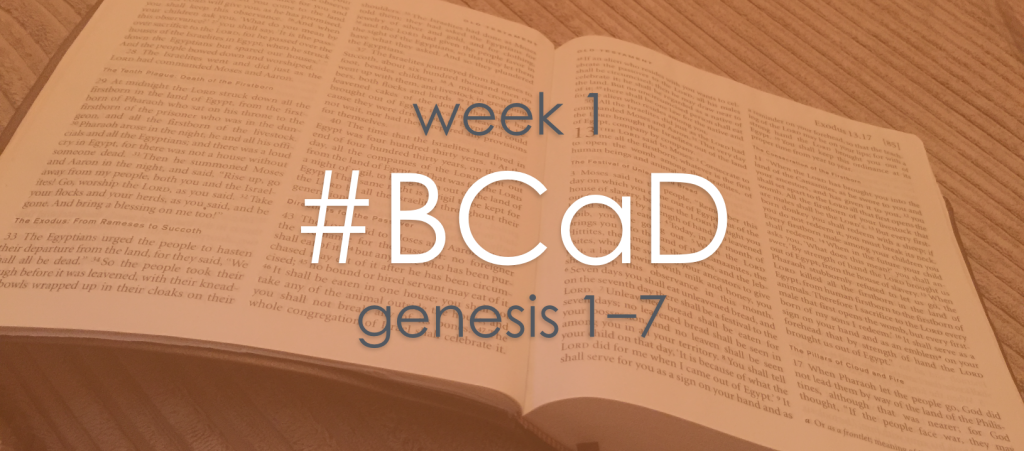
Week one of my #BCaD project has now happened, and it’s been so cool to see so many people joining in, reading the Bible and sharing their thoughts and reflections. This is a collection of my posts, and some short reflections I’ve written. I’m loving it! Also, check out these two blogs (here and here) that people I’ve met in just the last couple of months that they’ve set up to share their journey with #BCaD. If you’ve not got involved yet, join us!
Genesis 1
Gen 1. What? Creation. Who? God. Why? Love. The best bit? Humanity – He did it all so He could know us. When & how? Less important.
— Dave Criddle
It strikes me that a lot of talk about ‘creation’ is about the questions when and the how. It’s what we, with our 21st Century scientific interest are fascinated by. But the Bible doesn’t kick off with a science lesson. It kicks off with a beautiful, wonderful picture, verging on a poem, extolling the beauty of creation, and of the Creator. Telling us of God’s agency in creation. Telling us it is good, good, good, good and even very good once people are part of it. We are the pinnacle. God makes all of this as a canvas on which He can paint a relationship with us, those He has made in His image to love, cherish and journey with. That excited me far more than questions of how, when, six days or big bangs. That’s worth getting excited about!
Genesis 2
Gen 2. Humanity: God's idea for the good of the whole earth. Made for Him, for obedience, for each other. Such potential in us all.
— Dave Criddle
This chapter of the Bible, perhaps more than any other, give us a picture of what the world should be. Not what it is now, but what it should be. And the word for me that sums it up is ‘harmony’. Everything is in its place, as it should be. There is a closeness with God, where people live in submission to Him, happy with the rule He has over them. Not straining. There is an intimacy and mutuality about relationships between people, who are ‘not good’ alone, but who together are fulfilled and complete, totally comfortable together. Not ashamed. And people live at peace with nature, tending to it and nurturing it. Not striving. It’s a beautiful picture, and I want to live in that world.
Genesis 3
Gen 3. Everything goes wrong when God's words are twisted and God's rule is rejected. All has been broken, but God will restore it.
— Dave Criddle
All the peace and harmony of Genesis 2 is now undone. When God’s word is first questioned, then twisted, then straight out challenged and denied, people end up breaking relationship with Him, straining against His rule and choosing their own way. That’s sin. Not letting God be God. And it breaks everything. We see God separating Himself from them. We see Him declare their relationships with each other will be marked by dominance and shame, not be love and intimacy. We see that it will now be a battle with nature, not a dance. Every relationship is broken when we choose ourselves over God and others. But, even at the very beginning of brokenness, God promises a solution. One day, a descendant of Eve will come and defeat this snake, this enemy, and put all things right. Sin is born, but so is hope.
Genesis 4
Gen 4. In a broken world, sin crouches at the door. Where does the power to rule over it come from?
— Dave Criddle
So if a descendant of Eve will restore peace, who will it be? Maybe Cain or Abel. No. One is murdered, and the other a murderer. But even though they aren’t the solution (in fact Cain seems to be a product of the problem), God acts with grace and causes His protection to rest over Him. He is committed to us and to His people even when we aren’t committed to Him. And so the line continues. But then there’s another line through Seth. So many people, so many options, but who will God use. This sprawling story of the world and of the search for God’s promised one has begun, and we start to get the sense that it might be as quick as at first it might have seemed!
Genesis 5
Gen 5. Names. Fathers, sons, ages and names. Each new generation the potential for life, but death is the pattern. How long?
— Dave Criddle
Genesis 6
Gen 6. God looks on in sorrow at what we became. He can't leave it, so makes a way to restore us to who He made us to become.
— Dave Criddle
Genesis 7
Gen 7. The flood. We can be appalled at it, or let it show us how deeply and terribly God feels when He sees a world set against Him.
— Dave Criddle
The story of the flood is one that I find hard. It seems so drastic and big. It’s terrible and horrible. But the thing I choose to remember is that it’s terrible and horrible not because God is those things, but because sin is those things and the consequences of sin are those things. I can get outraged at this story, but instead I choose to let it push me out of complacency. It stops me settling for sin. And it shows me the tremendous lengths that God will go, and ask His people to go, in order to forge a way for hope to continue. Very specific, but huge, instructions given to Noah, and he steps up. Will I? And will I let this sobering story sink deep into my heart and urge me to strive for God’s best, not mine.
